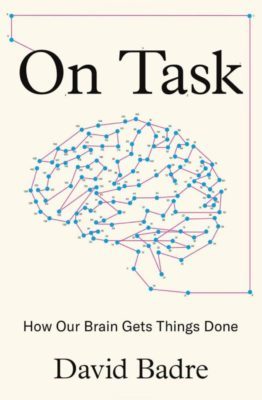The flexibility of human behavior
Scientists came to recognize cognitive control as its own class of function that links knowledge and action partly because of observations made of patients with damage to the prefrontal cortex. Early case reports were puzzling because these patients seemed unaffected by their brain damage. These patients would perform in the normal range on simple clinical tests of cognitive function, including tests of intelligence and higher mental function. Indeed, so impressive was their performance that, in the early part of the 20th century, some scientists thought that the anterior frontal lobes might not serve any essential function at all.
In the remaining posts this week, I will touch on a subset of these topics. In the next two posts, I will describe a fundamental mechanism of control called working memory gating and its underpinnings in the brain. In the fourth post, I will discuss inhibitory control. Finally, I will discuss how motivation interacts with control and our decisions about what tasks we do.
Cognitive control – also called executive function – has been notoriously difficult for scientists to define. As I put it in the book, “cognitive control processes live in the murky spaces between knowledge and action, influencing the translation from the first to the second while not being either one.” In broad strokes, cognitive control is a class of mechanisms that allows us to use our explicit goals, rules, plans, norms, and so forth to influence, organize, and monitor our actions. Control is needed to bridge knowledge and action. For example, it is not sufficient that I know that I should wear a mask when I’m indoors with other people or that I can state this rule or even that I want to wear one. I require cognitive control mechanisms to translate that explicit goal into a set of acts that realize my mask wearing objective in the variability, complexity, and dynamics of my world.

Though a rare event, this generativity and flexibility in our behavior is not unusual. Indeed, it often recognized as being characteristic of human intelligence. What is less widely recognized, however, is how this characteristic flexibility depends on a class of mental function that cognitive scientists and neuroscientists term cognitive control and which allows us to link our goals and plans with our actions.
Cognitive control as a link between knowledge and action
My book, On Task: How Our Brain Gets Things Done, offers a comprehensive introduction to our current understanding of cognitive control and its underpinnings in the brain. This detailed background might be of interest to philosophers whose work touches on theories of action and related topics, including free will, moral psychology, autonomy, self-control, and aspects of the will. I hope this series of posts will pique readers’ interest in topics that are treated in greater depth in the book. I appreciate the invitation from The Brains Blog to do so.
In the early part of 2020, millions of people around the world radically altered their daily behavior in response to the COVID-19 pandemic. We acquired new means of remote work, collaboration, and learning. We found new ways to entertain ourselves, to socialize, to grocery shop, and to raise our children. We adopted new norms, like redefining personal space at 6 feet and incorporating masks into our wardrobe. In short, our daily lives soon bore little resemblance to what had been unremarkable and routine only weeks before.
From the perspective of the science of the human mind and brain, this event is remarkable for the speed and success with which we engaged in this mass behavior change. Large numbers of people adopted entirely new behaviors within days based on beliefs about why they should do so or on the authority of others whom they trust or are obliged. This behavior change didn’t require the incremental pace of reinforcement learning or the glacial plod of evolution. Rather, societies envisioned a set of rules that they thought could stem viral spread, communicated these to each other, and then undertook the actions needed to perform them. And, we’re still adjusting as we learn more.
However, the lives of these patients outside of the clinic demonstrated that an essential function had indeed been lost. They were impulsive and disinhibited. They were unable to organize their behavior meaningfully. They suffered problems maintaining work and family relationships, and they struggled to live independently. They were incapable of planning and carrying out complex, sequential tasks, like preparing a meal for multiple people or having an evening out. Thus, in the open-ended complexity of the world, these patients struggled to organize their behavior in a goal-directed way.
Humans have a remarkable capacity to imagine new goals, counterfactual realities, and desired futures. We also have an action system that is organized compositionally, so that we can assemble new tasks and behaviors to achieve our the goals we imagine. Control allows us to leverage these two abilities to be generative in our behavior. On Task reviews the mechanisms of cognitive control along with computational tradeoffs it confronts in the service of a generative action system. In doing so, the book covers a wide range of topics that broadly inform our understanding of cognitive control.
Paradoxically, these patients could demonstrate their explicit knowledge for what they wanted to do, stating the rules for the tasks while breaking them or expressing their intentions while failing them. They could also carry out complex behaviors that they knew well, such as getting dressed for bed, or in the case of one former nurse, using a blood pressure apparatus. They simply couldn’t internally control when they performed these actions based on their goals or their broader context. Thus, one patient went through the process of dressing for bed even though he was in someone else’s bedroom, and the nurse used the blood pressure apparatus merely upon seeing an outstretched arm. Without cognitive control, these patients could not use what they explicitly knew of the world to guide their actions.